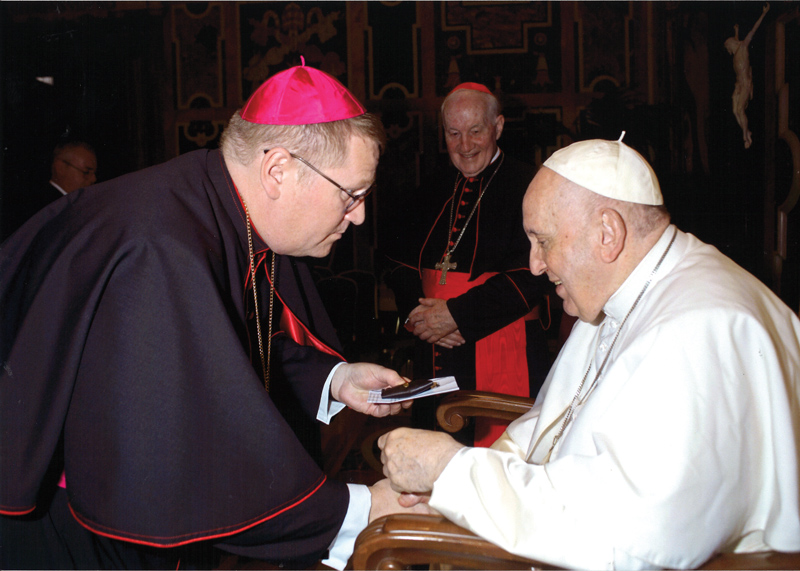‘Messiness of life’ proves to be fertile ground for Pope Francis at 10 years

Bishop Louis Tylka greets Pope Francis on Sept. 8, 2022, the final day of a weeklong course of formation in Rome for more than 150 new bishops from around the world. Bishop Tylka said the pope has influenced his ministry by affirming that life is messy and that's OK, because that's where we find God. (Photo courtesy of L'Osservatore Romano)
Bishop Louis Tylka knew when Pope Francis stepped out onto the balcony after his election on March 13, 2013, that things were about to change.
“He came out dressed more simply and asked for prayers for him before he offered prayers for us,” Bishop Tylka said. “Something was different. Something was changing.”
He said we trust that the cardinals who are the electors do so guided by the Holy Spirit. “That, I believe, has proven to be the case once again in Pope Francis.”
Bishop Tylka said that just by his presence and the manner in which he presents himself that the pope “has breathed new life into the church.”
“He has truly embodied the church’s wisdom and teachings through the Second Vatican Council,” the bishop told The Catholic Post. “He has invited us, I think, in a very powerful way, to reflect upon our identity as the church and in particular as missionary disciples. And he has created and shown the example of how we are to encounter and accompany and love everyone, especially those on the peripheries.”
MAKING CONNECTIONS
A lot of the critique of Pope Francis is misguided, Bishop Tylka said.
While some may think he has broken the “continuity and tradition” of the church, for example, “you can actually see a lot of continuity of the popes post-Vatican II, from Paul VI through Blessed John Paul 1 through St. John Paul II through Pope Benedict and now Pope Francis,” the bishop explained. “They are continuing to help us understand what we have been called to do when the church gathered for the Second Vatican Council.”
Bishop Tylka said a close look at what Pope Francis has written, as well as his actions, demonstrate that he embodies what the Second Vatican Council taught.
“He’s not changed the teachings of the church, but he has invited us to realize how we apply those teachings in the messiness of life,” he said.
An example of that is his 2015 encyclical “Laudato Sí, On Care for Our Common Home.”
“It’s not only the issue of our time and it’s not that he’s coming up with new concerns,” Bishop Tylka said. “He draws connections that we don’t necessarily look at.”
NO SIMPLE ANSWERS
In the document, the pope explores how the poor suffer when those who are not poor don’t show compassion and care for them. Bishop Tylka said it also pushes us to engage in conversations across society to come up with solutions.
“It raises the question how do we have to change collectively and how do I have to change individually? Where he is comfortable is not where most people are comfortable, because he is comfortable in the messiness of wrestling with those questions when most people want simple, clear answers,” the bishop said.
But Pope Francis is comfortable in allowing us to wrestle with the questions as opposed to dictating an answer, Bishop Tylka said.
He noted that the pope has influenced his own ministry by affirming that we’re all sinners in need of God’s mercy, and said the good news is that God’s mercy is so overwhelmingly given to us.
And by maintaining a focus on evangelization, Pope Francis is carrying on the mission given by Jesus to “go make disciples,” Bishop Tylka said.
—
Pray for the pope
Pope Francis started his pontificate by asking for prayers. People are invited to celebrate his 10th anniversary by offering one or more Hail Marys for him on March 13.
To find out more about “A Hail Mary for Francis,” go to decimus-annus.org. As of 7:30 a.m. on March 13, more than 45 million prayers had been pledged and the map could not refresh fast enough.





